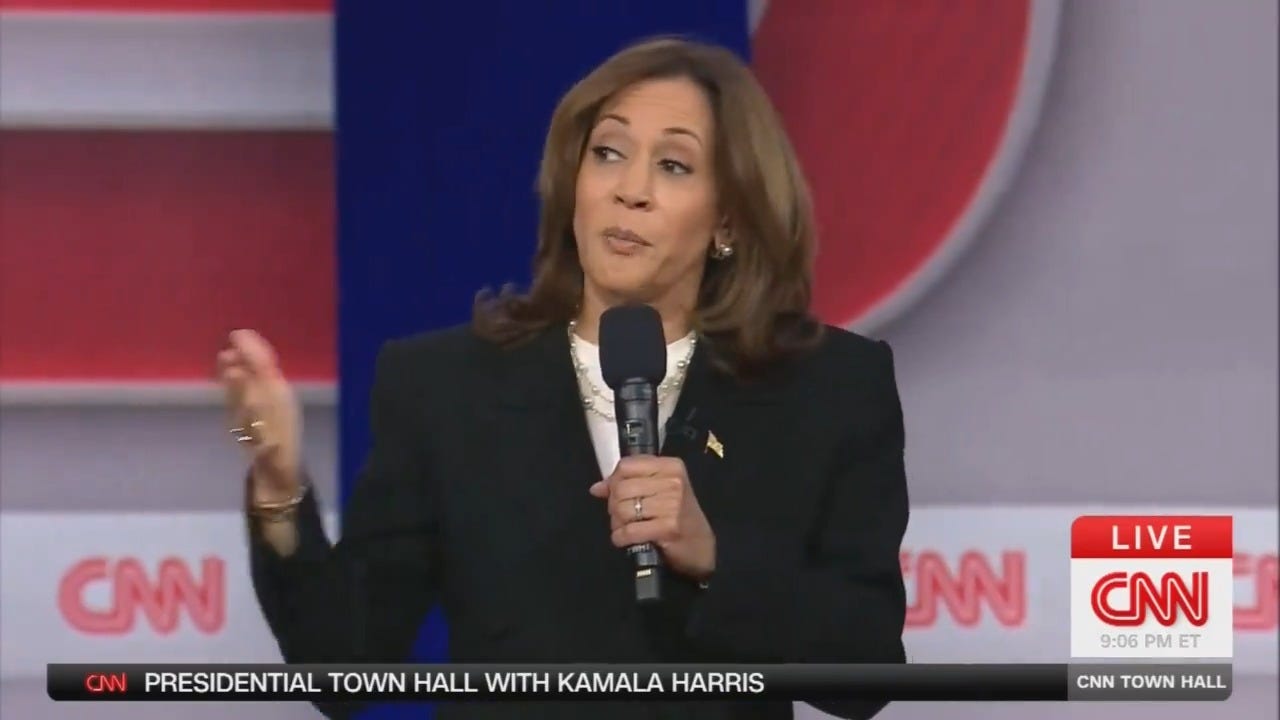Macbeth, a general in one of Shakespeare’s more famous armies, offers a profound insight in Act V of his renowned play. “It is a tale told by an idiot, full of sound and fury, signifying nothing,” he says.
As the presidential election race tightens, we are hearing many such furious tales from Donald J. Trump.
Consider his “wildly false personal attacks” on the vice president, as The New York Times put it. Trump labeled Harris a “low IQ individual” and suggested baselessly that she has a drinking problem and may be abusing drugs. In a typical case of what the psychologists call projection, he said she was not “mentally or physically able” to be president. He said the sitting VP, former senator and former California State Attorney General was “lazy as hell.”
Will these racist dog-whistles play well with his base? Will the billionaires atop Trumpworld and the white working class and rural folks on the bottom cheer him on for them, seeing them as more evidence that Trump is the ultimate anti-politician? That he speaks like they do?
There’s no doubt that some part of Trump’s base warms to the canards he hurls at Harris, especially since he has so little else to attack her for. But deeply ingrained racism and sexism can’t be the whole story that underlay some 46.3 percent of the electorate’s sentiments.
There’s likely something even more insidious and troubling at play.
A well-regarded political scientist who recently retired from the University of Nebraska-Lincoln sheds some light on what animates Trumpers. Prof. John Hibbing, author of The Securitarian Personality: What Really Motivates Trump's Base and Why It Matters for the Post-Trump Era, points to fundamental splits that divide American voters.
For Trumpers, the key issues are immigration, gun rights, the death penalty and defense spending. For Harris supporters, they are racial justice, healthcare, women’s rights and income inequality.
Hibbing developed this taxonomy from his observations, his work with focus groups and from a national survey that included more than 1,000 Trump backers. He argues that those in the Trump base crave a particular form of security that revolves around their key issues. Trump plays to their longings brilliantly.
Trumpers, Hibbing contends, feel threatened by those they regard as outsiders, groups that include welfare cheats, unpatriotic athletes, norm violators, non-English speakers, religious and racial minorities, and people from other countries. Their key aim – which allows them to disregard Trump’s immorality, dishonesty and corruption – is to elect someone they believe will shield them, their families and their dominant cultural group from these “outsider” threats.
If Hibbing’s framework is correct, what Trumpers crave is a strongman. And Trump’s well-honed image as an alpha male checks most of the boxes for them. Perverse as it may be, moreover, his prolific sexual history (including assaults) and his recent bizarre comments about Arnold Palmer’s genitals may only reinforce that macho image.
Indeed, one can only wonder whether recent comments about whether Trump is a “fascist” play well to the Trumpers Hibbing describes — that such claims may be counterproductive to those making them. Trump’s former White House chief of staff John F. Kelly, a retired Marine general, told The New York Times that Trump’s desire for power fits the fascist label.
And Mark T. Esper, who served as Trump’s secretary of defense, amplified that. On CNN, he said that “it’s hard to say” Trump does not fall into the category of a fascist. Moreover, as The Washington Post reported, that followed a warning from retired Gen. Mark A. Milley, former chairman of the Joint Chiefs of Staff, in a new book that the former president is “fascist to the core.”
Such sentiments give credence to the recent report in The Atlantic about Trump’s dissatisfaction with generals who bridled at his dictatorial impulses. “I need the kind of generals that Hitler had,” Trump said in a private conversation in the White House, the magazine reported.
But will enough Americans be alarmed by such comments, troubled by such judgments by people once close to Trump? Will most see Trump’s seeming “strength” as dangerous, unlike some Trumpers? And, more to the point, will they see Harris as a better alternative?
Of course, some may just play down or ignore such sentiments. Consider the apologists at The Wall Street Journal, who seem oblivious to Trump’s tsarist ambitions. The editorialists there invoke American checks and balances to suggest he would be reined in. By contrast, The New York Times warns that Trump’s “inner circle has been purged of people who say no. In a second Trump term, the secretary of state would not come from Exxon, and the secretary of the Treasury would not come from Goldman Sachs. The smart — and courageous — people have left the room.”
Certainly, some will warm to Trump’s tyrannical inclinations and his latest barbs. But this last-dash sound and fury could also cost him. Sensible voters may respond to Harris’s arguments that Trump’s vileness – the scorching and divisive language and lies that come so naturally to him – should be put well behind us. After all, does anyone really want more of this for the next four years?
Still, with most voters likely to have cemented their impressions of both candidates — and with many having already voted — it’s unclear how much difference the closing-days rhetoric will matter. Each candidate now wants mainly to mobilize their bases and, perhaps, chip away at the support of the other.
For her part, Harris aims to undermine Trump’s strongman image. Thus, her attack on him for being “weak.” Harris challenged Trump recently for refusing to release a report on his health, sit for a “60 Minutes” interview and commit to another presidential debate – all of which she did.
“It makes you wonder: Why does his staff want him to hide away?” she asked the crowd at a rally in Greenville, N.C. “One must question: Are they afraid that people will see that he is too weak and unstable to lead America?”
And she has embraced the “fascist” label for him. “We must take very seriously those folks who knew him best,” she said in a CNN town hall, referring to the numerous former Trump advisers who have broken with him.
“Do you think Donald Trump is a fascist?” host Anderson Cooper asked Harris. “Yes, I do. Yes, I do,” she replied.
She added that voters care about “not having a president of the United States who admires dictators and is a fascist.”
Strong charges, of course. But Harris is also waving a red flag about Trump’s mental acuity. And, given his increasingly erratic speech, her criticisms may carry weight with some voters still mulling over their choice.
Trump’s mental fitness has long been in doubt and, at 78, it’s as reasonable to question that as it was to question President Biden’s sharpness. Lately, Trump has served himself ill in this regard with the meandering talks he calls his “weave.”
He infamously cut off questions at a recent town hall outside Philadelphia and instead swayed to music on stage for 30 minutes. He bobbed his head through the Village People’s “Y.M.C.A.,” swayed to Rufus Wainwright’s “Hallelujah,” watched a Sinead O’Connor video, rocked along to Elvis, watched the crowd during “Rich Men North of Richmond” and then, finally, left the stage to shake hands on his way out.
More recently, his campaign canceled at a virtual town hall he was scheduled to take part in, suggesting he is tiring. Reporters have noted that his energy is flagging at some events, and he’s lost his way verbally – never his strength anyway.
He discussed the porosity of limestone in Washington, D.C., as he complained about vandalism. He referred to his so-called Front Row Joes — devoted superfans he often points out during his rallies — as Front Row Jacks, then corrected himself by calling them “the Front Row Jacks and Joes.” He got Harris’s gender wrong in a comment about vice presidential nominee Tim Walz. And, at a McDonald’s, he couldn’t recall the word “fryer.”
“Those French fries were good. They were right out of the, uh — they were right out of whatever the hell they make them out of,” Trump said.
As The New York Times reported on Oct. 17, Trump described mail-in ballots as “so corrupt,” reviving one of his false attacks on the 2020 election results. Then, he shared his thoughts about when he watched SpaceX, Elon Musk’s spaceflight company, fly a rocket back onto its launch site.
Such bizarre off-script comments gain attention, for sure. These “flashes of controversy and oddity,” as The Wall Street Journal described them, have spawned headlines and airtime. Perhaps his followers simply disregard them, choosing instead to hear about how much he plans to deport immigrants and otherwise protect them from various threats.
But one has to wonder, do we really want a president who has trouble finishing thoughts as he practices “the weave?” And might geriatricians have other descriptions for such rambling, with characterizations that are more medical and psychological? One must ask: how would incoherence — especially when it’s vicious, racist and vindictive — serve us for the next four years?






